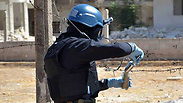
OPCW inspectors in Syria
Photo: AP
Israel has chemical weapons and must reconsider its refusal to join the international treaty prohibiting the possession and use of such arms, a top official of the Organization for the Prohibition of Chemical Weapons told Israeli journalists this week.
Buoyed by its impressive success in dismantling Syria’s chemical weapons program, for which it was awarded the 2013 Nobel Peace prize, the OPCW is now intent on bringing on board Israel and the five other remaining states that have not joined the 190-nation treaty.
Three of the six – Myanmar, Angola and South Sudan – are expected to join within the coming year, leaving North Korea, Egypt and Israel as the last holdouts.
Having overseen the removal of the last of Syria’s declared chemical weapons stocks and destruction of its production and storage facilities, the OPCW believes Israel should reconsider its long-standing refusal to join the treaty, which went into effect 17 years ago.
The organization has had contacts on the subject with the Israeli embassy in The Hague, but no formal talks.
Israel maintains what it calls a policy of ambiguity, neither confirming nor denying its suspected nuclear and chemical weapons capabilities. It has offered various explanations for its refusal to join the chemical weapons treaty, among them that it does not believe Syria’s program has been completely eradicated.
“Our learned assumption is that not all of it has been destroyed,” says one official. And military officials have said Syria retains a residual capability.
“I cannot tell you 100 percent that they didn’t hide something, you might have a few munitions here and there, but not a program to produce them,” says a top OPCW official. Starting in 2013, the organization’s inspectors oversaw the removal of all 1,300 tons of Syria’s declared prohibited chemicals and 98 percent of them have been destroyed aboard a specially equipped ship, the Cape Ray, and in facilities in Finland and elsewhere.
The amounts declared were in keeping with information received from the United States as well as Russia, which supplied Syria with much of its chemical arsenal, the official said.
But the OPCW, too, recognizes that Syria’s declarations, which have been amended 10 times since the initial one, may not have been complete.
Based on information received from several countries, the organization sent a team to Damascus this week to ask about some discrepancies.
“We suspect that such and such a place may not have been declared. We will ask them if they can provide proof that it no longer exists or whether we can inspect the site,” the official explained.
Another question involves the blister agent, mustard gas. Syria only declared 20 tons, saying it had unilaterally destroyed hundreds of additional tons at the beginning of 2013 – a practice employed by other states prior to their accession to the treaty. Soil samples from the site could also provide some answers as to whether these stocks were destroyed.
Syria declared 12 CW storage facilities and 27 production facilities. So far all the equipment at those sites has been rendered inoperable – destroyed by hammers and crowbars in the presence of OPCW inspectors – but five tunnel and seven hangars have to be razed to the ground.
The first, a tunnel, will be blown up in the presence of an OPCW team in mid-January. The razing of 11 other facilities will take six to seven months.
Israel now only has one neighbor with a significant chemical arsenal – Egypt – which has thousands of tons of such lethal compounds, according to the OPCW. Egypt, one of only two Arab states to have a peace treaty with Israel - insists it will join the treaty once Israel does.
The OPCW hopes the United States, an important Egyptian ally, will convince the new government in Cairo to follow Syria’s example. “I think Israel should be under pressure from its allies, too,” said the official.
“You have a very well equipped conventional army, you have good defensive programs against chemical and biological weapons. You will never use chemical weapons, anyway, and there are many more advantages to joining the treaty than not. It would be embarrassing to be the only ones with North Korea to have CW.”
Ironically, Israel was closely involved in the drafting of the treaty and was one of its first signatories in 1993, under the late Prime Minister Yitzhak Rabin.
“Those were different times, after the Madrid peace conference (between Israel and the Arab states) and just ahead of the Oslo Accord with the Palestinians),” says an Israeli official. “The Middle East today is not the Middle East of then. We are living in a wild neighborhood, not of our own making, in a climate of total uncertainty.”
Article republished with permission from i24NEWS















